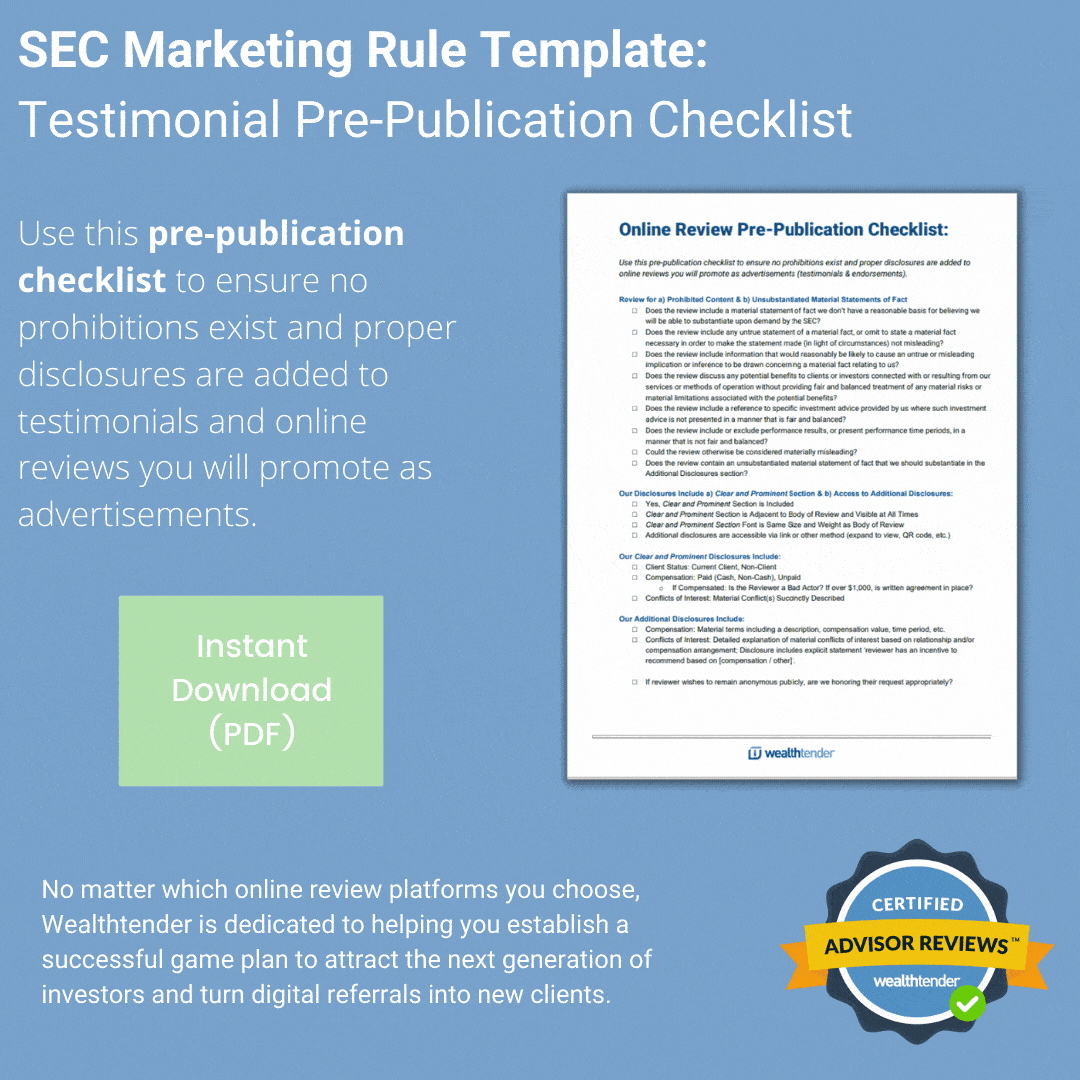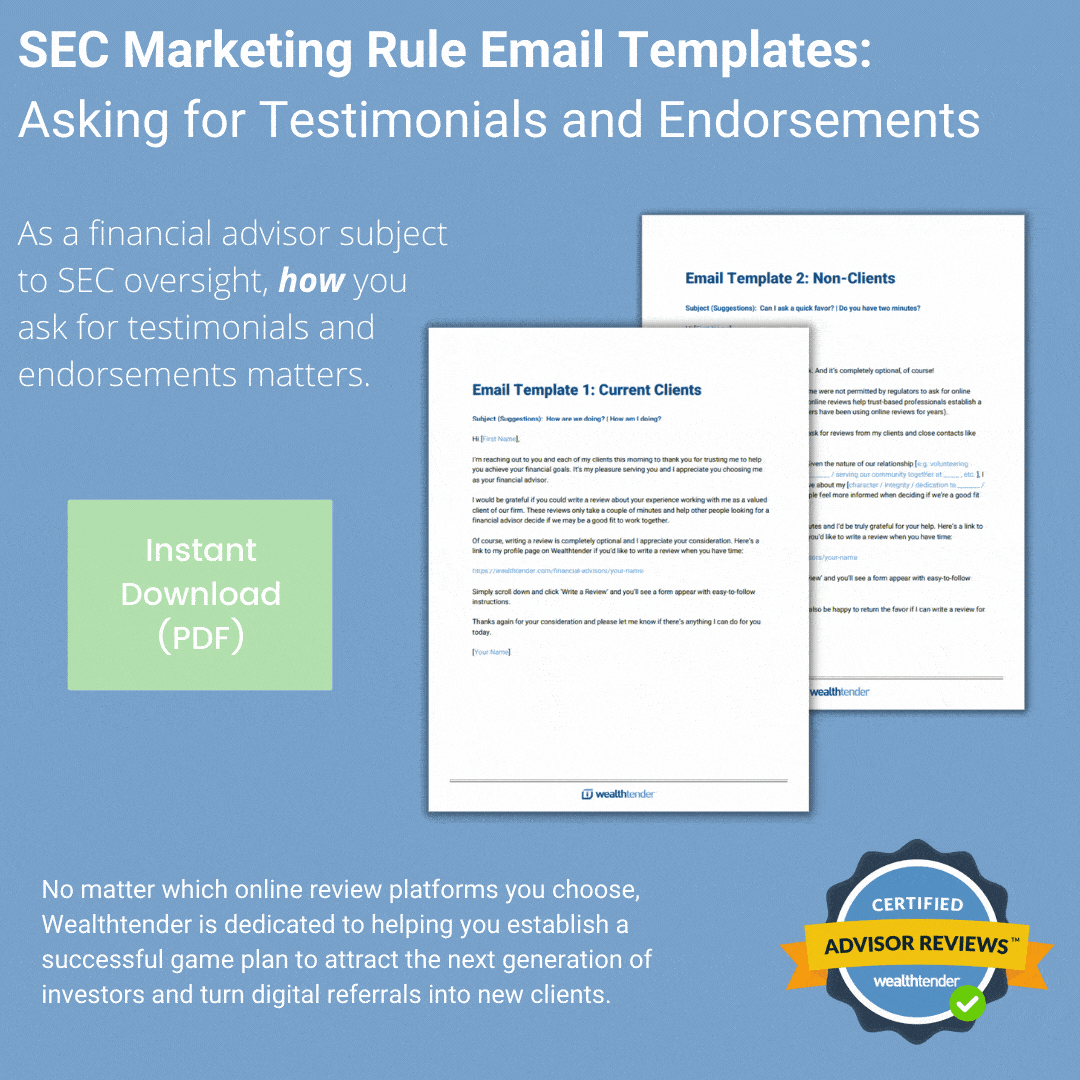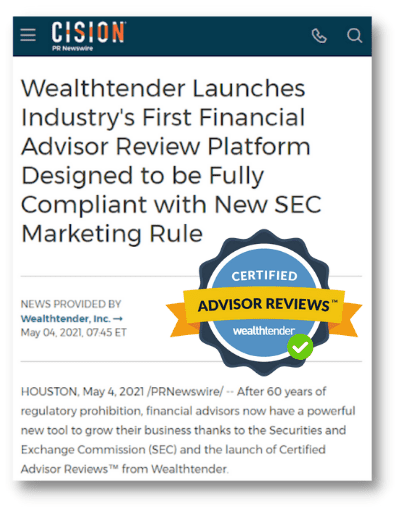
SEC Marketing Rule Education Series:
Getting Started with Testimonials and Endorsements
The SEC took action. Now, it’s your turn.
Financial advisors and wealth management firms gained a powerful new tool to attract new clients and grow their business with solicited testimonials when the SEC Marketing rule became effective on May 4th, 2021.
Wealthtender developed its SEC Marketing Rule Education Series of articles, templates, and checklists to help financial advisors and industry stakeholders:
- Establish policies and procedures that satisfy SEC Marketing rule requirements
- Prepare compliant disclosures that instill consumer trust and confidence
- Choose the right online review platforms to collect, display, and promote testimonials
- Ask clients for testimonials thoughtfully and compliantly
- Accelerate business growth and attract new clients with compliant marketing strategies
Whether you choose to grow your business with Certified Advisor Reviews™ designed by Wealthtender for SEC compliance or decide upon another path for testimonial marketing, we hope this SEC Marketing Rule Education Series will help you achieve exceptional results with your online reviews for years to come.
About Wealthtender
Wealthtender is a modern digital marketing platform for financial advisors ready to lead the industry in attracting new clients throughout the historic transfer of trillions of dollars in wealth from Baby Boomers to Millennials over the next decade.
Get in Touch
Hi! 👋 I’m Brian Thorp, Founder and CEO of Wealthtender. If you have questions about the SEC Marketing rule, interest in learning more about Wealthtender, or just want to say hi, I look forward to hearing from you. Please write, call, or schedule a Zoom meeting for us at your convenience.
Wealthtender Founder & CEO Brian Thorp

Brian Thorp
Wealthtender Founder & CEO
LinkedIn Profile
brian@wealthtender.com
(512) 856-5406

Wealthtender is the first financial advisor review platform designed to be fully compliant with the SEC Marketing rule. Wealthtender Certified Advisor Reviews™ help consumers make smarter hiring decisions when choosing a financial advisor. (Learn More)
Articles to Help You Succeed with Testimonials
Establishing Your Policies and Procedures
As an SEC registered investment adviser, the policies and procedures you develop for your firm’s testimonials and endorsements to comply with the SEC Marketing rule will need to be incorporated into your existing written policies and procedures established to prevent violation of the Advisers Act.
In this article, we’ll guide you through important topics discussed by the SEC in the Marketing rule, including opportunities and potential risks you’ll want to consider to help you prepare your policies and procedures for supervision of your firm’s activities associated with testimonials and endorsements.
⭐ At the end of the article, you’ll find a template you can download to help you prepare policies and procedures for your firm.
Preparing Compliant Disclosures
In this article, we explain the specific disclosure requirements prescribed by the SEC for testimonials and endorsements to help you craft disclosures that are compliant with the SEC Marketing rule.
Beyond regulatory compliance, we also discuss how thoughtfully prepared disclosures instill trust and confidence in consumers, helping them make more informed and educated decisions when evaluating financial advisors.
⭐ At the end of the article, you’ll find an online review pre-publication checklist template you can download and use to ensure your testimonials and endorsements published online are compliant with SEC Marketing rule requirements.
Choosing the Right Advisor Review Platforms
Where you choose to collect, display and promote testimonials and endorsements matters. This is especially true for financial advisors and wealth management firms subject to SEC oversight.
In this article, we compare features and policies of general online review platforms (specifically Google and Yelp) to a dedicated industry online review platform (Wealthtender), and your own website to understand the pros and cons of each. We also share insights worth considering for compliance with the SEC Marketing rule.
⭐ Within the article, you’ll find a table highlighting relevant features and policies you’ll want to consider when choosing the platforms you’ll use to collect, display and promote your online reviews.
Asking for Reviews and Testimonials
As a financial advisor subject to SEC oversight, how you ask for testimonials and endorsements matters.
In this article, we’ll explain how you can solicit reviews from your clients (testimonials) and non-clients (endorsements) for compliance with the SEC Marketing rule.
⭐ At the end of the article, you’ll find an email template you can use and further customize to ask for testimonials from your clients (along with a separate email template to ask for endorsements from non-clients).
Testimonial Marketing Strategies to Grow Your Business
Once you’ve begun collecting testimonials and endorsements online, you’re all set to turn your reviews into a powerful source of new referrals.
Without lifting a finger, the positive reviews you’re collecting online are already sending signals to search engines like Google that you’re trustworthy and deserving of increased visibility in search results.
In this article, we’ll show you how you can promote your testimonials and endorsements both online and offline to attract new clients while maintaining compliance with the SEC Marketing rule.
Templates & Checklists
Why Financial Advisor Reviews Matter
The SEC Marketing rule offers opportunities for advisors to succeed
as the next generation of investors becomes the now opportunity for growth.
Learn how you can make the most of online reviews to grow your practice:
The Problem(s) with Google Reviews
Google and Yelp are well-known review platforms popular with consumers. And many advisors already have unsolicited reviews written about them visible on these sites. If these are favorable reviews and are truly unsolicited, that’s terrific as advisors gain SEO benefits and visibility among consumers visiting these sites.
But because reviews on Google and Yelp lack the required SEC disclosures to be considered advertisements (e.g. testimonials and endorsements you can promote to grow your business), advisors can’t direct prospects to check out their reviews on these platforms.
Advisors should think twice before using Google to collect reviews. Here are a few reasons why:
- Google displays competitors on advisor profile pages.
- It is unlikely Google will modify their platform to make Google Reviews compliant if the SEC deems a review to be an advertisement.
- When advisors ask clients to leave a review on Google, it may be deemed an advertisement by the SEC, according to securities industry attorney Max Schatzow. If this occurs, advisors will be in violation of the SEC rule as Google is not designed to comply with SEC disclosure requirements.
- While the SEC will let advisors compensate clients for a review, Google prohibits the practice.
- Requesting the removal of Bad Actors as defined by the SEC will require filing a legal violation which can take time and effort.
How Consumers Use Online Reviews
As a financial advisor, it’s important to understand how the new SEC Marketing rule could affect you and your advisory business. Even if you don’t plan to ask for reviews or include reviews in your own marketing activities, you’ll need to be prepared to respond to questions from prospects and existing clients when they begin to see reviews appear online for other financial advisors.
While online reviews may be new to financial advisors, an evaluation of their impact on local businesses and professionals in other industries demonstrates why it’s imperative to begin preparing for a future where consumers are empowered to voice their opinions about you and your services.
The importance of online reviews on local businesses can be seen in numerous research reports conducted each year.
In an annual report prepared by BrightLocal based on a survey conducted in November 2020, 87% of consumers said they read online reviews for local businesses in 2020, up from 67% in 2010. The report indicated after reading a positive review for a local business, the next most likely actions are visiting the website of the business, searching for additional reviews to validate their choice and visiting the business in person.
And according to a research survey conducted in October 2020 by SurveyMonkey Audiences commissioned by Podium, among the 1,543 consumers surveyed, 88% said online reviews played a role in discovering a local business, 65% have read an online review in the last week and 41% said online reviews are 1 of the 3 most important factors they consider when choosing a local business.
Financial advisors interested in growing their practice should take note of these additional findings:
- 85% said employee attitude is the leading motivation to leave a positive review
- 58% of consumers said they would be willing to travel farther to a business with better reviews
- 47% are willing to pay more at a business with higher reviews
- Over 60% of consumers said they are likely to leave a review after a good experience with a local business when the business follows up with a link in an email asking for a review
As Emmy-winning writer David Pogue wrote about online review sites in Scientific American nearly 10 years ago, “No longer are you on top of the mountain, blasting your marketing message down to the masses through your megaphone. All of a sudden, the masses are conversing with one another. If your service or product isn’t any good, they’ll out you.”
How Wealthtender Compares
Wealthtender is the first independent financial advisor review platform designed to be fully-compliant with SEC regulations.
The SEC marketing rule served as the blueprint for building the Wealthtender review platform. Financial advisors can confidently collect and display reviews on their Wealthtender profile page with the required disclosures clearly and prominently displayed as prescribed by the SEC.
Unlike other review platforms, Wealthtender incorporates workflows for financial advisors to provide required disclosures which may be unique for each individual review. This ensures advisors can rest easy during SEC exams and sweeps when asked how reviews are used in their marketing activities.
To learn more about how Wealthtender compares to Google Reviews and other potential financial advisor review platforms, click here.
Online Reviews & Advisor Search Results
Will online reviews of financial advisors impact how prominently a financial advisor and their website appears in Google search results?
Very likely, the answer is yes, thanks to E-A-T and YMYL.
E-A-T And YMYL
E-A-T is a term used by Google that stands for Expertise, Authoritativeness and Trustworthiness as it pertains to the creator of website content. The term originates from a 175-page document used by human ‘Quality Raters’ to assess the quality of Google’s search results.
YMYL is another term defined by Google in the document as topics that could impact ‘Your Money or Your Life’. Specifically, Google states that “Some types of [web] pages or topics could potentially impact a person’s future happiness, health, financial stability, or safety. We call such pages “Your Money or Your Life” pages, or YMYL.”
Financial advisor websites are already subject to higher E-A-T and YMYL standards by Google than websites on topics of less importance to people’s lives.
When online reviews of financial advisors proliferate, Google’s guidelines for Quality Raters hint at the importance they’ll place on third party reviews over client reviews found directly on a financial advisor’s website. Specifically, Google states “you must also look for outside, independent reputation information about the website. When the website says one thing about itself, but reputable external sources disagree with what the website says, trust the external sources.”
By joining Wealthtender, financial advisors increase their E-A-T scores in the eyes of Google, strengthening their online reputation and improving their ranking in online search results.
Lessons for Advisors from Lawyers & Docs
For doctors and lawyers, online reviews have simply become a fact of life and requirement for conducting business. For financial advisors preparing for the new Investment Adviser Marketing rule, it’s worth considering insights gained about the role of online reviews across both professions.
What Financial Advisors Can Learn About Online Reviews From Doctors And Lawyers
With millions of reviews of doctors and lawyers, these sites often rank on the first page of Google results when consumers search for these professionals. In the BrightLocal consumer review survey, 89% of consumers said they look at reviews of medical professionals and 81% look at lawyer reviews. Over 80% of consumers said they believe reviews are important across both categories of professionals.
In 2018, an NRC Health Market Insights Study of over 3,000 patients showed that 37% used online reviews as their very first step in searching for a new doctor. And even when getting a recommendation from someone they trust, 21% then turned to online reviews to verify what they were told.
Additional findings included:
- 83% said they trust online ratings and reviews more than personal recommendations
- 48% trust online ratings and reviews as much as a recommendation from their doctor
- 75% want to see at least 7 ratings before they trust a doctor
- 66% consider reviews older than 18 months to be out of date
- 59% said positive and negative reviews are equally valuable to them
- 60% said they’re suspicious if they only see positive reviews for a doctor
In 2018, a Martindale-Avvo survey of 6,300 consumers asked the criteria that mattered most to them when choosing an attorney. When asked what information they desired before their first contact with an attorney, online reviews or client testimonials ranked 5th among 20 factors. The survey also noted consumers aged 25-35 gave greater weight to reviews and testimonials than consumers over age 54.
Additional consumer findings included:
- 47% used online review sites and directories to find an attorney (more than any other resource)
- 46% read online reviews of an attorney to conduct additional research after a personal referral
As Meranda Vieyra eloquently stated in The National Law Review, “The great thing about online reviews is that you have power to present your law firm and yourself with dignity and class, regardless of how good or bad your online reviews are.” For financial advisors preparing for the Investment Adviser Marketing rule, these words may prove prescient.
SEC Marketing Rule FAQs
Q: What is the effective date of the SEC Investment Adviser Marketing rule?
A: The SEC Investment Adviser Marketing rule became effective on May 4, 2021, 60 days after it was published in the Federal Register.
Q: What is the compliance deadline for the SEC Investment Adviser Marketing rule?
A: The compliance deadline for the SEC Investment Adviser Marketing rule is November 4, 2022, eighteen months after the May 4, 2021 effective date. (Source: Federal Register)
Q: What are SEC expectations for advisor reviews under the new rule?
A: Financial advisors who choose to include client reviews in their advertising under the new rule will need to work closely with their compliance officers to ensure they satisfy the SEC’s new disclosure and oversight requirements.
Key SEC expectations for advertisements featuring financial advisor reviews include:
– Clear and prominent disclosure indicating: If a review is from a client or non-client
– Whether or not the reviewer was compensated
– How the reviewer was compensated (in cash or otherwise)
– Any conflicts of interest (including a description of conflicts)
– A written agreement must be in place between a financial advisor and reviewer (unless the reviewer receives less than $1,000 for their review in cash or otherwise within a 12 month period)
The SEC also made it clear these requirements apply even if the review is a social media post like a tweet with a limited number of characters.
Q: Why can’t I find more financial advisor reviews on Yelp?
A: Since it’s a violation of Yelp’s terms of service for businesses to ‘solicit or ask for reviews’ from their customers, financial advisors are unable to encourage their clients to write a review on Yelp.
Q: Can financial advisors have Google Reviews?
A: Google and Yelp are well-known review platforms popular with consumers. And many advisors already have unsolicited reviews written about them visible on these sites. If these are favorable reviews and are truly unsolicited, that’s terrific as advisors gain SEO benefits and visibility among consumers visiting these sites.
But because reviews on Google and Yelp lack the required SEC disclosures to be considered advertisements (e.g. testimonials and endorsements you can promote to grow your business), advisors can’t direct prospects to check out their reviews on these platforms.
Introducing Certified Advisor Reviews™.
Certified Advisor Reviews™ help consumers make smarter hiring decisions when choosing a financial advisor. Wealthtender is the first financial advisor review platform designed to be fully compliant with the SEC Investment Adviser Marketing rule.
With Certified Advisor Reviews™, you can:
- Confidently ask your clients (and acquaintances) for reviews
- Promote your reviews to attract new clients
- Strengthen your online reputation with clients and prospects
- Establish your trustworthiness with Google and Bing
- Demonstrate your consumers’ interests first mindset
- Unlock reviews trapped on sites like Google and Yelp
- Import and certify reviews from Google & all other platforms
Thinking about asking for reviews on sites like Google or Yelp? Think again.
We’ll be the first to admit if we’re wrong. But we’re not wavering in our belief that forthcoming SEC guidance will clarify that review platforms like Google and Yelp simply aren’t compatible with the SEC Marketing rule, thus limiting acceptable use of these platforms to only include unsolicited reviews.
Here’s What We Know with Certainty:
Google and Yelp are well-known review platforms popular with consumers. And many advisors already have unsolicited reviews written about them visible on these sites. If these are favorable reviews and are truly unsolicited, that’s terrific as advisors gain SEO benefits and visibility among consumers visiting these sites.
But because reviews on Google and Yelp lack the required SEC disclosures to be considered advertisements (e.g. testimonials and endorsements you can promote to grow your business), advisors can’t direct prospects to check out their reviews on these platforms.
Here’s What We Don’t (Yet) Know:
Unlike unsolicited reviews published on Google or Yelp, the SEC has not formally offered guidance to clarify if solicited reviews on Google and Yelp are deemed an advertisement, and therefore subject to the prohibitions and disclosure requirements described in the SEC Marketing rule. So the question we need the SEC to answer is: Does the act of a financial advisor simply asking for a review to be written on specific platforms like Google or Yelp entangle an advisor in its creation and trigger the prohibitions and disclosure requirements?
While industry opinions are mixed on the guidance the SEC will ultimately provide, we believe it’s highly likely the SEC will take issue with advisors proactively soliciting reviews on platforms known to be incompatible with the Marketing rule. With its principles-based rule intended to ensure consumers gain important information to make more informed decisions, we don’t expect the SEC to look favorably upon a rampant proliferation of advisor reviews on platforms incapable of addressing the Marketing rule’s prohibitions and disclosure expectations.
Further, we believe the SEC could point to FINRA Regulatory Notice 17-18 that addresses this topic covering testimonials of registered representatives. In the notice, FINRA states: “FINRA does not regard unsolicited third-party opinions or comments posted on a social network to be communications of the broker-dealer or the representative for purposes of Rule 2210, including the requirements related to testimonials in paragraph (d)(6).”
Wealthtender has submitted written requests for clarification on this matter to the SEC (likely along with many other industry participants) and we monitor the SEC’s Marketing rule FAQ page daily. We’ll share updates as additional SEC guidance becomes known.
October 12, 2021 Update: The SEC Investment Adviser Regulation Office (within the Division of Investment Management) responded by email to Wealthtender confirming their team will consider updating the SEC Marketing rule FAQ page to address the analogous question answered by FINRA in Regulatory Notice 17-18 that could put this matter to rest.
Michael Kitces Offers His Perspective on Certified Advisor Reviews™

“… Wealthtender is launching a more centralized “Advisor Reviews” platform, where advisors can sign up for a page on Wealthtender that centralizes all of their Google, Yelp, and other third-party website reviews, and repackages them as “Certified Advisor Reviews” (reviewed by Wealthtender) for which the advisor can add a Reviews badge to their website (linking to their Wealthtender profile).
…Nonetheless, the reality is that because testimonials have long been recognized as such a powerful marketing tool – including in financial services, where for decades they were only banned because they were deemed too influential and at risk for abuse! – it seems inevitable that client testimonials will soon become a core part of advisor marketing. The only question is how, exactly, advisory firms will find it best to collect and share them for the (right) prospects to see?”
– Michael Kitces at Nerd’s Eye View
The Latest in Financial #AdvisorTech (June 2021)










